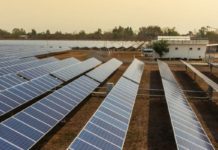The Gauteng Department of Economic Development said on Friday that it had developed a green economic development strategy for the province, to foster the development of manufacturing capacity and job creation.
Economic Development Member of the Executive Council (MEC) Firoz Cachalia said that Gauteng’s main green-economy challenge would be to turn the climate change “crisis” into an opportunity ensuring that jobs were being created rather than displaced.
The national government has said that a green economy would play a key role in South Africa’s shift to a “new growth path”, with the government focusing on more labour-absorbing industries.
Economic Development Minister Ebrahim Patel has indicated that 300 000 jobs could be created in South Africa’s renewable energy sector over the next ten years, of which 20 000 is achievable in the next two years.
Cachalia said that Gauteng needed to work with trade unions to stimulate its manufacturing sector to produce renewable energy equipment locally, rather than relying on Chinese imports.
“However, we are also cognisant of the fact that we will not become a green economy over night since we are still challenged to meet our existing energy requirements, through coal-fired energy sources,” he commented.
Gauteng plays a significant role in contributing towards the national carbon footprint, through its manufacturing and mining sectors as well as the need to provide energy to the more than ten-million people.
“Nevertheless, we need to be weaned off these energies or find complementary energy so that we can generate endogenous growth, promote sustainable development and fulfil our international obligations,” said Cachalia.
As part of the Copenhagen Accord, South Africa has commited to take nationally appropriate mitigation action to enable a 34% deviation below the ‘business as usual’ emissions growth trajectory by 2020, and a 42% deviation below the ‘business as usual’ trajectory by 2025.
Cachalia said that the Gauteng Economic Development Department had allocated R130-million over the next three years for green projects. including R32-million for food security through the Moringo Oliviera project in the province, a little over R5-million for piloting waste sorting in informal settlements, and R77-million for an alternate energy from waste project.
Cachalia explained that the bulk of the funds were allocated to infrastructure investment for the roll-out of programme initiatives in 2012/13.
For the current year, R7-million had been allocated for researching the feasibility of the programme together with the Department of Agriculture and the University of Pretoria, focusing on bio-technology while investing in agricultural development.
“The technologies will be incorporated into a labour-intensive agri-business programme that will create sustainable jobs and promote food security. This programme includes skills development and training, while biofuels are produced in local communities to feed the energy production platform,” said Cachalia.
Sedibeng had been identified as an ideal area to stimulate economic growth and activity.
A small pilot project to create employment through liquefied petroleum gas vehicles had also been started up.
Committed to ‘greening’ the economy, the department had allocated R20-million in 2011/12 budget and R30-million in 2012/13 to incentivise the development of a solar industry, focusing in particular on the solar water heater initiatives.
In the 2010/11 financial year, Cachalia said that the government would finalise the differnet regulatory changes and mechanisms that needed to be made to support the solar water heating sector.
The national Human Settlements and the Department of Energy had also allocated funds for subsidising solar water heating initiatives in low-cost housing, coupled with the demand-side management fund at the State-owned utility Eskom, which subsidises efficient energy sources.
Further, South Africa’s Industrial Development Corporation had budgeted R11,7-billion over the next five years in green industries. Cachalia said that here too, cooperative governance was essential to ensure scalable success of the programmes.
In addition, in 2011/12, R101,1-million had been allocated to the Climate Innovation Development Centre, together with the World Bank. The centre is a small, medium-sized and microenterprises (SMMEs) incubation facility supporting innovations related to climate change products.
The centre is expected to incubate about 150 SMMEs.
“The green economy is considered to be the new growth sector for the 21st century and South Africa should act expeditiously and decisively to ensure that new ideas, technologies and investments are leveraged to create decent jobs, strengthen our industrial base and reduce our carbon footprint,” concluded Cachalia.
Engineering News












